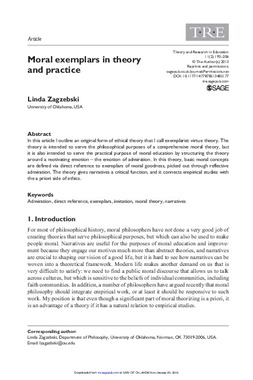| dc.contributor.author | Linda Zagzebski | |
| dc.date.accessioned | 2016-01-14T19:53:40Z | |
| dc.date.accessioned | 2016-03-30T15:32:09Z | |
| dc.date.available | 2016-01-14T19:53:40Z | |
| dc.date.available | 2016-03-30T15:32:09Z | |
| dc.date.issued | 2013-07-01 | |
| dc.identifier.citation | Zagzebski, L. (2013). Moral exemplars in theory and practice. Theory and Research in Education, 11(2), 193-206. doi: 10.1177/1477878513485177 | en_US |
| dc.identifier.uri | https://hdl.handle.net/11244/25386 | |
| dc.description.abstract | In this article I outline an original form of ethical theory that I call exemplarist virtue theory. The theory is intended to serve the philosophical purposes of a comprehensive moral theory, but it is also intended to serve the practical purpose of moral education by structuring the theory around a motivating emotion – the emotion of admiration. In this theory, basic moral concepts are defined via direct reference to exemplars of moral goodness, picked out through reflective admiration. The theory gives narratives a critical function, and it connects empirical studies with the a priori side of ethics. | en_US |
| dc.language.iso | en_US | en_US |
| dc.publisher | Theory and Research in Education | |
| dc.subject | Admiration | en_US |
| dc.subject | direct reference | en_US |
| dc.subject | exemplars | en_US |
| dc.subject | imitation | en_US |
| dc.subject | moral theory | en_US |
| dc.subject | narratives | en_US |
| dc.title | Moral exemplars in theory and practice | en_US |
| dc.type | Research Article | en_US |
| dc.description.peerreview | Yes | en_US |
| dc.description.peerreviewnotes | https://us.sagepub.com/en-us/nam/manuscript-submission-guidelines | en_US |
| dc.identifier.doi | 10.1177/1477878513485177 | en_US |
| dc.rights.requestable | false | en_US |
